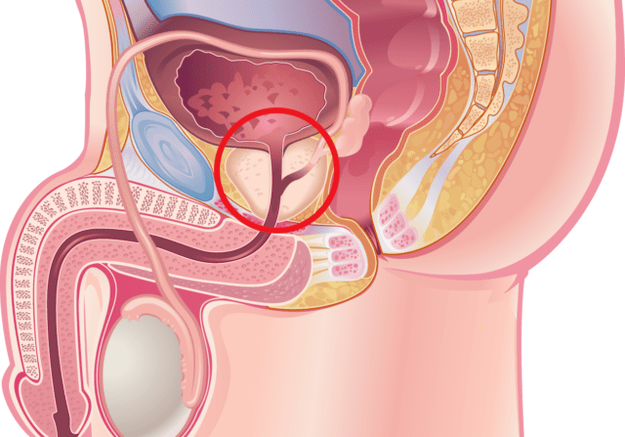Prostate inflammation or prostatitis ICD is highlighted with a few numbers in its list. It all depends on the form of the pathology and the nature of its origin.
What is ICD
There is a regulatory document used by the medical profession, which is regularly reviewed by the World Health Organization. It includes a list of all diseases and pathologies that occur in humans. It is called the International Classification of Diseases (ICD). Its main goal is to help study the patient's condition and create the best conditions for this by systematically registering available data. Information is collected from all over the world and encoded with specific names. It can be supplemented and retrieved at any time for further research.
important! The ICD table contains classes and groups marked with codes. A title may contain multiple forms and manifestations of the same disease. For convenience, the entries are arranged in alphabetical order.

Prostate disease according to ICD-10
The list of diseases includes:
- Acute prostatitis ICD 10 41. 0;
- Chronic prostatitis ICD 10 41. 1;
- Prostate abscess-41. 2;
- Prostatitis-41. 3;
- Other inflammations of the prostate-41. 8;
- Unspecified inflammatory diseases of the glands-41. 9.
Ordinary people do not need to know the ICD code. Only a doctor can decipher and encrypt a diagnosis.
Prostatitis according to ICD-10
According to ICD 10-41 prostatitis code. If benign hyperplasia develops in an organ, the disease is assigned a different number. According to the ICD 10 adult prostate code, the adenoma registration number is 40 to 51. These titles include various fibroids and fibroids.
It is the most common urinary system disease affecting men of any age. In general, the inflammatory process in glandular tissue is most often observed in a chronic form, with no obvious signs of acuteness at the beginning.
Experts classify diseases according to the nature of the course:
- Acute, occurs in 50% of patients under 30-35 years of age. Mainly related to bacterial infection;
- Chronic. It will not manifest itself for a long time and can develop in the context of the infection process.
As it happens, it happens:
- Bacteria that occur in organs;
- It is not bacteria, where pathological changes mainly occur in chronic form;
- Viral, the entire genital area will be affected.
According to the nature of the structural changes, they are distinguished:
- Fibrous. The growth of glandular tissue occurs fairly quickly and requires radical treatment. It is clinically similar to ICD of prostate adenoma, of which 40. 0;
- calculate. It occurs when stones are formed in glandular organs. It is considered a precursor of cancer;
- Stagnant form. Occurs from physical inactivity and long-term abstinence.
Causes and symptoms
Chronic and acute pathologies of the glands are directly related to improper lifestyles, addiction to tobacco and alcohol, and poor physical activity.
The main reasons why this disease occurs even in young men are:
- Infections transmitted by sexual contact: Neisseria gonorrhoeae, Escherichia coli, Chlamydia, etc. Frequent changes of sexual partners will increase the risk of illness;
- Congestion of pelvic organs related to impaired blood circulation;
- Sedentary, sedentary lifestyle, lack of exercise;
- Long-term abstinence, abuse of drugs that prolong intercourse, deliberately delaying ejaculation in intimate relationships to prolong ejaculation time;
- decrease in immunity;
- Psychological and emotional pressure, severe pressure;
- Excessive manual labor;
- Low temperature;
- Malfunction of the endocrine system;
- Unbalanced diet;
- Addiction.
The signs of the development of acute and chronic inflammation of the prostate are similar. The doctor will help identify the form of the disease after the examination and diagnosis.
Features
Acute type is accompanied by severe clinical symptoms, and all tissues of glandular organs are involved in the pathological process. Therefore, this disease is painful and difficult: elevated body temperature, general signs of poisoning.
The patient complained:
- Heaviness and pain in the groin, pelvic area, and waist;
- The sensation of squeezing the rectum;
- Increased urge to urinate, including at night;
- Urethral pain after ejaculation and emptying of the bladder.
In chronic diseases of the lower abdomen, some men experience varying intensities of pain, erection, and potency problems. In 95% of cases, the disease is actually asymptomatic.

ICD codes for acute and chronic prostatitis
Chronic prostatitis ICD code 41. 1. Any adverse factors will worsen. Acute inflammation of ICD 41. 0 can cause glandular edema, accompanied by acute urinary retention.
Such diseases can cause serious complications without proper treatment:
- Bladder obstruction;
- The development of male infertility;
- Urethral stricture and scarring;
- Recurrent cystitis;
- Pyelonephritis and other diseases that affect the kidneys;
- Suppuration of gland tissue requires immediate medical intervention;
- Sepsis, most often occurs in people with weakened immunity.
Pathological diagnosis
In some cases, a single rectal examination and familiarity with the patient’s chief complaint are sufficient to make a diagnosis. However, inflammation is mainly diagnosed through laboratory and instrumental inspection methods.
The patient is called:
- Blood and urine tests to determine infection and inflammation;
- Prostate secretion analysis;
- Ultrasound examination of prostate, kidney and bladder;
- Urethral cytoscopy;
- MRI of pelvic organs;
- PSA blood test;
- Biopsy
- X-ray.
One of the most effective diagnostic methods is a digital rectal examination of the prostate. Although in the acute form, the organs are very sensitive, and the process can cause severe pain to the patient.
Treatment strategy
Chronic prostatitis, whose ICD code is listed in the International Disease Registry, requires complex treatment. It is recommended that patients correct their diet, change their lifestyles, give up harmful addictions, and start eating correctly.
Also appointed:
- drug. It helps relieve pain, reduce inflammation, and activate the regeneration of damaged cells in glandular organs. Mainly use suppositories, as well as antibiotics.
- Prostate massage. It is considered to be the most effective way to get rid of the stagnant process of the glands. It is carried out independently or with the help of experts. This process is considered unpleasant, but it must be executed without fail.
- Balneotherapy. With the help of mineral water in the nursing home, men manage to cope with chronic diseases. Drinking healing water and bathing are very useful.
- physiotherapy. The effect of thermal physiotherapy is excellent. It helps to absorb drugs quickly, relieve general symptoms, and increase blood circulation to problem organs.
- Diet is an important step in treatment. The diet of the recovered person should contain vitamins, fiber, amino acids and mineral compounds. You must avoid junk food (kimchi, marinades, bacon, fried, high-fat foods). The ideal product list includes yogurt drinks, lean meats and fish, nuts, dried fruits, and pumpkin seeds.
Surgery is rarely used for chronic inflammation when other treatments have not produced a positive effect or the purulent process has begun.
Acute needs use drugs, microenemas, rectal suppositories, analgesics, and analgesics. Show that the patient is resting in bed and refusing to be intimate. Once the acute period has passed, prostate massage and physical therapy will be prescribed. For such diseases, it is very important to choose the necessary drugs. This is only possible after a correct diagnosis. Experts say what kind of funds will be prescribed and how many doses.
prevention
In order not to develop and worsen prostatitis, the adult’s ICD code 10 is ranked 41st, and you should follow the following rules:
- Live an active and healthy lifestyle. If you can't go to the gym, you should do more morning exercises, warm up during workdays, and walk more often. A kind of gymnasium will be used as stairs, and people climb the stairs to his apartment every day;
- Avoid hypothermia: do not sit on a cold surface, dress for the weather, etc. ;
- Constipation, including food that relaxes the intestines in the diet, and taking mild laxatives. If the disease persists, it is recommended to consult an expert;
- Regulate sex life. Long-term abstinence is the first step leading to the development of glandular diseases. If you don't have a fixed sexual partner, you can temporarily replace him with masturbation, but don't get involved in this activity;
- Avoid sexual intercourse without barrier contraception. Sexually transmitted diseases may not be noticed at first, but they can severely damage glandular tissues and cause infectious prostatitis;
- If you suspect a sexually transmitted infection, you should consult a STD or urologist. It is sufficient to check to find out the cause of the unpleasant symptoms;
- It is necessary to see a urologist at least once a year to rule out the possibility of disease onset.
Comment
- "International classification is of great importance in the treatment of prostate inflammation of any etiology, because the ICD 10 code allows you to accurately determine the type of disease, make a diagnosis and take effective treatment measures. "
- "My father has a prostate adenoma. The doctor deciphered the ICD code after confirming the diagnosis. This stage was ignored and the glands almost tripled. The operation was scheduled and the operation was very successful. With age (over 60) andWith the emergence of other chronic diseases, recovery was delayed. Now he has no complaints about the genitourinary system. "
- "G. Prostatitis ICD 41. 1 is on my card. I have suffered from this disease for a long time, but it rarely gets worse, because I do everything I can to avoid acute symptoms. The doctor said that chronic diseases will not go away and may beIt lasts for a long time if you monitor your health appropriately. Therefore, I go for exercise-I run every morning, exercise, don't drink, and don't smoke. "

























